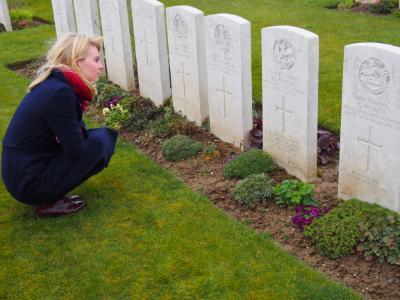Ellie Grigsby (BA History, 2016)
Article
Ellie Grigsby gains an insight into personal grief by visiting the grave of a relative
Visiting Private Herbert Samuel Grigsby’s grave, Caterpillar Valley Cemetery, 31st March 2016
Relatives of my family have made progress with extensive research into my family tree, including the story of an ancestor who was reported missing and eventually found dead on the Somme on 22nd July 1916. Due to the ‘Life in the Trenches’ special subject trip, I was brought in close proximity of his grave stone and consequently able to see it in the Caterpillar Valley Cemetery. Of course, we have limited information of the character of this man and to this date we are still un-sure of his exact relation to me personally on which I am awaiting an answer. However, the emotional connection I felt while kneeling in front of the stone was something that really took me by surprise, a feeling that was unexpected.
Before Christmas time last year, I lost my grandfather who just missed his 94th birthday. He was more than just an ‘older figure’ in my life, but someone quite like a best friend. To see the name ‘Grigsby’ engraved on Herbert’s stone, it immediately registered in my mind how he was a piece of my story. Every family has a narrative to tell, full with individuals who tell their own part of the story. Herbert’s life was one that would never be like mine, only one I can dare to imagine. ‘The price paid for freedom’ is often a phrase used to describe any conflict, past and future. Seeing my surname on this grave stone brought home to me how detached we become bombarded with war figures and statistics and how each man had a family at home and a family that would inevitably grow without him. My grandfather was in a reserved occupation during the Second World War as a steel erector and never saw combat, being something that I always think about. If he was sent to fight, the dynamics of my family could have been forever changed.

As I mentioned, I know minimal information about Herbert but felt an instant connection to the grave because of his place in my family history. His grave stone read: ‘no morning dawns, or nights appear but our thoughts of you remain.’ I thought about the family who would have chosen this poignant and beautifully emotive message to forever remain in memory of Herbert and how we have chosen words for my grandfather. It seems although a century has passed I can with grief, sympathise as to how Esther and John Grigsby felt when their dear son never returned from the front.